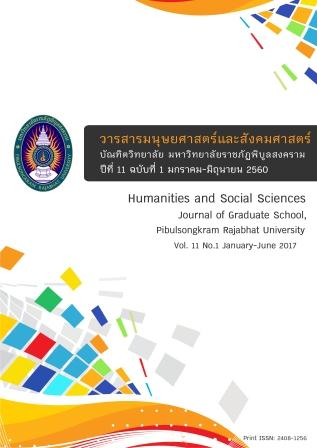การจัดประสบการณ์การเรียนรู้โดยใช้เกม เพื่อพัฒนาทักษะปฏิบัติในการว่ายน้ำของเด็กปฐมวัย
Keywords:
การจัดประสบการณ์การเรียนรู้โดยใช้เกม, ทักษะปฏิบัติในการว่ายน้ำ, พฤติกรรมการเล่น, เด็กปฐมวัย, Learning experience with games, Swimming practical skills, Playing behavior, pre-school childrenAbstract
บทคัดย่อ
การวิจัยครั้งนี้มีจุดมุ่งหมายเพื่อศึกษาทักษะปฏิบัติในการว่ายน้ำของเด็กปฐมวัยที่ได้รับการจัดประสบการณ์การเรียนรู้โดยใช้เกม และเพื่อศึกษาพฤติกรรมการเล่นของเด็กปฐมวัยที่ได้รับการจัดประสบการณ์การเรียนรู้โดยใช้เกม กลุ่มตัวอย่างเป็นเด็กปฐมวัยที่กำลังศึกษาอยู่ในระดับชั้นอนุบาลปีที่ 3 โรงเรียนโรจนวิทย์มาลาเบี่ยง ภาคเรียนที่ 1 ปีการศึกษา 2559 จำนวน 1 ห้องเรียน 42 คน ได้มาโดยการสุ่มแบบกลุ่ม เครื่องมือที่ใช้ในการวิจัยประกอบด้วย แผนการจัดประสบการณ์การเรียนรู้โดยใช้เกม จำนวน 3 แผน แบบทดสอบวัดทักษะปฏิบัติในการว่ายน้ำ และแบบบันทึกพฤติกรรมการเล่นของเด็กปฐมวัย วิเคราะห์ข้อมูลเชิงปริมาณด้วย ค่าร้อยละ และวิเคราะห์ข้อมูลเชิงคุณภาพด้วย วิธีการวิเคราะห์เนื้อหาแบบลงข้อสรุป ผลการวิจัยพบว่า
1. เด็กปฐมวัยส่วนใหญ่ จำนวน 32 คน มีทักษะปฏิบัติในการว่ายน้ำอยู่ในระดับดีมาก และเมื่อพิจารณาทักษะปฏิบัติในการว่ายน้ำของแต่ละด้าน พบว่าเด็กส่วนใหญ่มีทักษะปฏิบัติในการดำน้ำและการลอยตัว อยู่ในระดับดีมาก ส่วนทักษะปฏิบัติในการเตะขา อยู่ในระดับดี
2. เด็กปฐมวัยมีพฤติกรรมการเล่นทั้ง 4 แบบ โดยส่วนใหญ่ในพฤติกรรมการเลียนแบบ เด็กสามารถทำตามคำสั่งครูและเลียนแบบครูผู้สอนได้ ในพฤติกรรมการสำรวจ เด็กมีความกระตือรือร้นและสนใจในการเล่นเกม ในพฤติกรรมการทดสอบ เด็กสามารถเล่นเกมให้ถูกวิธี ตามกฎ กติกาได้ และในพฤติกรรมการสร้าง เด็กมีความความสัมพันธ์กับเพื่อนในกลุ่ม และให้ความร่วมมือในการทำกิจกรรม
Abstract The purposes of this research were 1) to study swimming practical skills of pre-school children being learnt experience management with games, 2) to study playing behavior of pre-school children being learnt experience management with games. The samples were 42 pre-school children by cluster sampling from pre-school 3 Rojanawit Malabiang School in the first term 2016. Research tools were 1) 3 lesson plans in learning with games for swimming practical skill development, 2) swimming practical skill test and, 3) record playing behavior form. Quantitative data were analyzed by percentage and qualitative data were analyzed by content analysis with conclusion. The research results were as follows: 1. Most pre-school children were at excellent level in swimming practical skills. When considering each type, diving and floating in water practical skills, most children were also excellent, but they were at a good level in kicking in water. 2. Pre-school children had all four playing behaviors, most were good in “imitation behavior” for they could follow the teacher commands and imitate him; in “exploration behavior” they were enthusiastic and interested in game playing; in “testing behavior”, they could play by rules and in “construction behavior” they had good relationship and cooperation with friends in their group.
Downloads
How to Cite
Issue
Section
License
Any articles or comments appearing in the Journal of Humanities and Social Sciences, Rajabhat Phibulsongkram University, are the intellectual property of the authors, and do not necessarily reflect the views of the editorial board. Published articles are copyrighted by the Journal of Humanities and Social Sciences, Rajabhat Phibulsongkram University.









